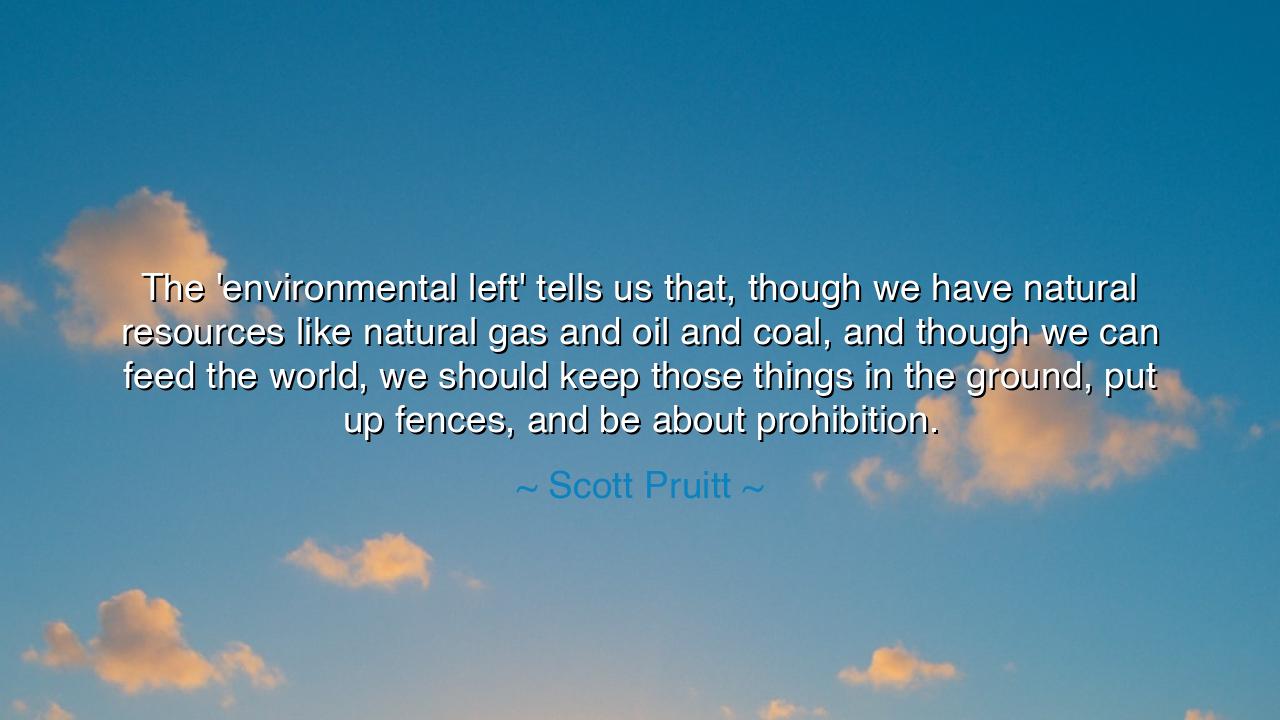
The 'environmental left' tells us that, though we have natural
The 'environmental left' tells us that, though we have natural resources like natural gas and oil and coal, and though we can feed the world, we should keep those things in the ground, put up fences, and be about prohibition.






In the discourse of nations and the stewardship of the earth, Scott Pruitt spoke with a tone both political and philosophical when he said: “The ‘environmental left’ tells us that, though we have natural resources like natural gas and oil and coal, and though we can feed the world, we should keep those things in the ground, put up fences, and be about prohibition.” Behind these words lies an ancient tension—the struggle between use and restraint, between the promise of abundance and the peril of excess. It is the same struggle that has echoed through every age of human civilization: how to wield power over the natural world without destroying the very foundation upon which we stand.
To the ancients, the earth was not mere soil and stone, but a living mother—a force both generous and demanding of respect. In Mesopotamia, where the first cities rose, people drained marshes and diverted rivers to grow crops, yet the overuse of the land brought salinization and famine. The lesson was clear, though often forgotten: mastery of nature requires wisdom as much as ambition. When Pruitt speaks of natural resources, he invokes humanity’s eternal temptation to see the earth as a treasure chest to be emptied, rather than a partner to be nurtured. His words remind us that conflict arises not from scarcity, but from differing visions of how prosperity should be pursued.
The heart of his statement reveals a deeper question—what is value? To one side, resources are wealth waiting to be released; to the other, restraint itself is wisdom, a moral duty to preserve the earth’s balance. Pruitt’s critique of the “environmental left” captures this dichotomy. Yet the ancients would warn that both paths, if followed blindly, lead to ruin. For unbridled extraction brings desolation, while absolute prohibition invites stagnation. Between these extremes lies the narrow road of harmony, where human ingenuity serves both progress and preservation.
Consider the example of the Roman Empire, whose engineers reshaped landscapes, building aqueducts and quarries to sustain cities. Their mastery of natural resources created a golden age of architecture and agriculture—but their overreliance on distant mines, forests, and fields hastened their decline. The soil grew thin, the forests vanished, and Rome’s power eroded. The story repeats across history: every civilization that forgets balance learns humility through collapse. The earth, patient and vast, always reclaims its due.
Pruitt’s words, though born of political debate, touch upon a truth as old as humanity: the quest for balance between need and reverence. Technology and discovery grant us the means to feed the world, to heat our homes, to build cities of light. But without the motivation to use them wisely—without an ethical compass—our progress becomes its own undoing. The “fences” he speaks of need not be prohibitions born of fear; they may instead serve as boundaries of wisdom, reminding us where creation ends and destruction begins.
The lesson for our age is not to shun development, but to elevate it through responsibility. True stewardship of the earth does not demand abstinence from its gifts, but discernment in their use. A society that drills without reflection or forbids without reason serves only its extremes. The ancients would call for measure—that every act of taking be paired with gratitude, and every act of building be shadowed by foresight. To harness the earth’s wealth and still honor its spirit is the work of wisdom, not ideology.
Practically, this means cultivating balance in every sphere of life: investing in renewable energy while managing necessary extraction with conscience; innovating without waste; consuming with awareness; teaching the young not merely how to build, but why. When profit and preservation walk hand in hand, when knowledge and humility guide our hands, humanity may finally learn to dwell upon the earth as both master and servant—creator and caretaker.
Thus, Scott Pruitt’s reflection becomes more than a critique—it becomes a mirror. “The environmental left tells us to keep our resources in the ground.” His words challenge us to define our relationship with the earth: are we plunderers or partners? The ancients would answer simply: power without reverence brings ruin. Let us then walk the middle path—bold in innovation, humble in stewardship—and remember that the true wealth of the world lies not in what we take from it, but in what we preserve for those who will follow.






AAdministratorAdministrator
Welcome, honored guests. Please leave a comment, we will respond soon